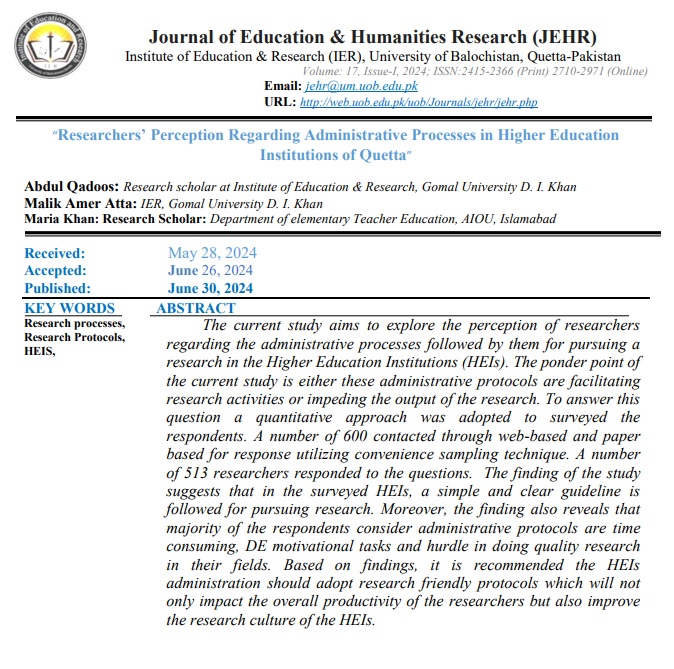Researchers’ Perception Regarding Administrative Processes in Higher Education Institutions of Quetta
Abstract
The current study aims to explore the perception of researchers regarding the administrative processes followed by them for pursuing a research in the Higher Education Institutions (HEIs). The ponder point of the current study is either these administrative protocols are facilitating research activities or impeding the output of the research. To answer this question a quantitative approach was adopted to surveyed the respondents. A number of 600 contacted through web-based and paper based for response utilizing convenience sampling technique. A number of 513 researchers responded to the questions. The finding of the study suggests that in the surveyed HEIs, a simple and clear guideline is followed for pursuing research. Moreover, the finding also reveals that majority of the respondents consider administrative protocols are time consuming, DE motivational tasks and hurdle in doing quality research in their fields. Based on findings, it is recommended the HEIs administration should adopt research friendly protocols which will not only impact the overall productivity of the researchers but also improve the research culture of the HEIs.
References
Åkerlind, G. S. (2008). An academic perspective on research and being a researcher: An integration of the literature. Studies in higher education, 33(1), 17-31.
Boudah, D. J., & Lenz, B. K. (2000). And now the rest of the story: The research process as intervention in experimental and qualitative studies. Learning Disabilities Research & Practice, 15(3), 149- 159.
Cohen, S. (1980). Aftereffects of stress on human performance and social behavior: a review of research and theory. Psychological bulletin, 88(1), 82.
Hall, K. L., Feng, A. X., Moser, R. P., Stokols, D., Taylor, B. K., & Nebeling, L. C. (2008). The ecology of interdisciplinary research: Implications for health policy. Health Affairs, 27(2), 390-398.
Ioannidis, J. P. A., Greenland, S., Hlatky, M. A., Khoury, M. J., Macleod, M. R., Moher, D., ... & Tibshirani, R. (2014). Increasing value and reducing waste in research design, conduct, and analysis. The Lancet, 383(9912), 166-175.
Jindal-Snape D, Snape JB (2006) Motivation of scientists in a government research institute: scientists’ perceptions and the role of management. Manag Decis 44(10):1325–1343. https://doi.org/10.1108/00251740610 715678.
Kiley, M., & Mullins, G. (2005). Supervisors' conceptions of research: what are they?. Scandinavian Journal of Educational Research, 49(3), 245-262.
Koenraadt, R. (2017). A structured approach to protocol development for research in global health. Transactions of the Royal Society of Tropical Medicine and Hygiene, 111(6), 235- 238.
Lam A (2011) What motivates academic scientists to engage in research commercialization: gold, ribbon or puzzle? Res Policy 40(10):1354– 1368. https://doi.org/10.1016/j.respol.2011. 09.002.
Lounsbury JW, Foster N, Patel H, Carmody P, Gibson LW, Stairs DR (2012) An investigation of the personality traits of scientists versus nonscientists and their relationship with career satisfaction: relationship of personality traits and career satisfaction of scientists and nonscientists. R&D Manage 42(1):47–59. https://doi.org/10.1111/j.1467- 9310.2011.00665.x.
Moher, D., Schulz, K. F., Simera, I., & Altman, D. G. (2010). Guidance for Developers of Health Research Reporting Guidelines. PLoS Medicine, 7(2), e1000217. doi: 10.1371/journal.pmed.1000217
Nosek, B. A., Ebersole, C. R., DeHaven, A. C., & Mellor, D. T. (2018). The preregistration revolution. Proceedings of the National Academy of Sciences, 115(11), 2600-2606.
Okada, A., & Sheehy, K. (2020, December). Factors and recommendations to support students’ enjoyment of online learning with fun: A mixed method study during COVID-19. In Frontiers in education (Vol. 5, p. 584351). Frontiers Media SA.
Resnik, D. B., Rasmussen, L. M., & Kissling, G. E. (2015). An international study of research misconduct policies. Accountability in Research, 22(5), 249-266.
Smidt, N., Bouter, L. M., & Tomlinson, A. (2015). The PRISMA 2020 Statement: An Updated Guideline for Reporting Systematic Reviews. BMJ, 372, n71. doi: 10.1136/bmj.n71.




